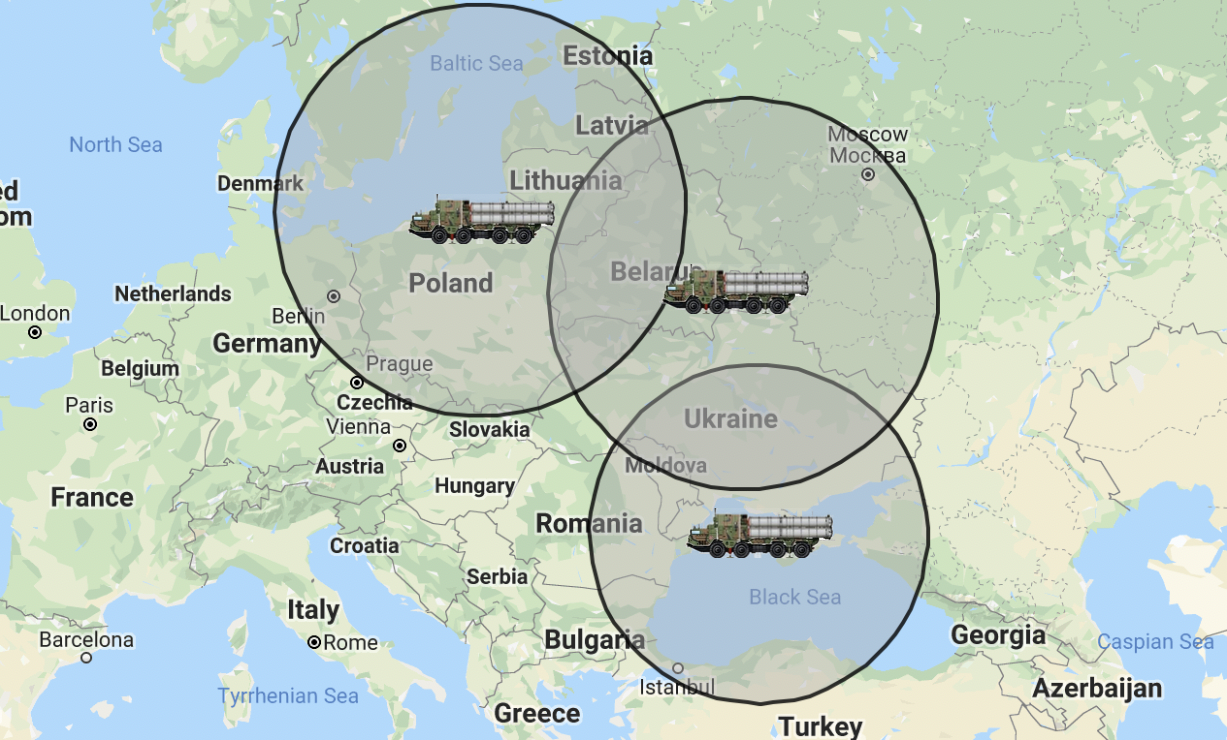
Expected Coverage of Russian S-500 Missile Systems From Kaliningrad, Central Province and Crimea – Militarywatchmagazine.com
Lemberg, known today as Lviv under Ukrainian rule and Lvov/Lwow under former Polish administrations, was the principal city of the region of Galicia that is now split between Ukraine and Poland. The city of Lemberg was the historical name when that region was under the rule of the Austro-Hungarian Empire. After being part of the front during First World War, Galicia switched hands between several different nations with many of the same residents often experiencing the horrific changeovers, ethnic conflicts, war and genocide. With the end of the Second World War, the region was officially ceded to Stalin’s Soviet Government and many of the residents expelled from their home region. Ethnic tensions were often the catalyst for the various bouts of violence, and were used as a cause de la guerre for regional power politics.
A foreshadowing of further military conflict in the region has been the focus on news reports regarding Russian relations with Ukraine. Russia looks to be seeking a reset of its boundaries in an effort to boost local support for its Government and play on national concerns of historic threats to Russia coming from Western powers. With the end of the Warsaw Pact, nations that were once controlled from Moscow and acted as a physical barrier to Germany and NATO were now becoming part of NATO. This placed NATO weapons and radar systems closer to Russia’s borders. The Ukraine, as one of the largest countries in Central/Eastern Europe, was always a large barrier between Russia and the West. Ukraine was always the focus of Moscow’s leadership in negotiations with NATO, placing Ukraine at a distance when NATO had no reservations accepting Poland, the Czechs or Hungarians into their fold.
Modern Russian expansion policy often takes place for tactical reasons, but is shrouded in claims of ethnic divisions in border regions between local people and local citizens of Russian descent living in the disputed territories. Conflicts between Russia and Georgia were based in this policy and lead to a short conflict. Russia assaulting and occupying Crimea also came from a similar catalyst, but it was well regarded as a strategic move as Russia’s Black Sea Fleet was always stationed at Sebastopol; even when under Ukraine’s Government, and is considered a key historic battle ground for Russia’s Government and people.
With Russian influence waning in Ukraine’s Government after the 2014 elections, Russian support for separatist forces in the Donbas region of Ukraine started to mirror Russian moves on Crimea a few months earlier. While political tactics lead to a takeover without much violent conflict in Crimea, heavy fighting took place between Russian supported forces and Ukrainian Defence Forces in the Donbas region. The conflict spilled outside the region and garnered international attention when Malaysian Airlines Flight 17 was shot down by a SA-11 BUK missile over the disputed territory, killing all abroad while the flight was peacefully making its journey from Amsterdam to Kuala Lumpur.
News of the larger conflict was reduced when the shooting down of MH17 occurred. In the past, international condemnation of the Soviet Union when its SU-15 fighter plane shot down a Korean Airlines 747 with two missiles lead to a permanent scar on Soviet relations with the rest of the world in the 1980s. This is said to have contributed to the fall of the Soviet Union, and President Putin likely was aware of this effect. Blame for the act was mixed with hidden information and spin, and created a blueprint for hiding the blame for these types of murders by military equipment when it occurred again over Iran in January of 2020.
The focus on relations with Russia changed drastically as Russia gave direct military support to Syria in combatting what they likely saw as fascist elements trying to overthrow the Assad Regime after months of gains by ISIS in Syria and Iraq. The US and other allies rhetorically opposed Russia’s increased influence in the Middle East, but did little to counter it, and coordinated with Russian Forces to avoid conflict and perhaps target their mutual enemy. Power politics in the Middle East shifted with Russian Armed Forces participating in the conflict, and showed that the US and Europeans were no longer to be depended on for full support. The long term effect was not only to legitimise Russian Foreign Policy actions in the region, but also took the focus off the Donbas and made US Foreign Policy appear as it was entering a phase of decline.
With a weak United States after the Afghanistan pullout, Russia is likely taking the opportunity to rearm and renegotiate the terms of its historical deal post Soviet Union in Europe. Russian fuel to Western Europe, combined with their influence in the Middle East and modernising military with S-500 missiles has been countered by US military aid to Poland and Ukraine, but has received little attention by media in the United States over the last few years. The Donbas has almost become a forgotten issue outside of Eastern Europe, and current posturing by President Putin may be successful as Americans would never support sending troops to fight in a muddy field in Ukraine when they have daily local political drama to contend with, to Russia’s benefit. While the value of the Donbas region may be limited to a large country like Russia, the current state of global affairs may the the biggest catalyst for the conflict, and Russia is likely using it to expand its distance from NATO to gain local support. Its a situation that will not be resolved by foreshadowing a hot war, insults, nor lost lives of soldiers or locals, but through appropriate and measured foreign policy measures.